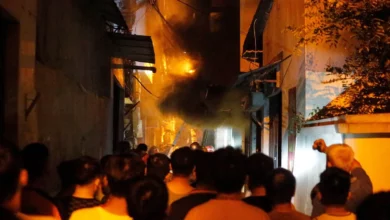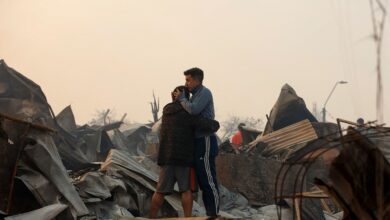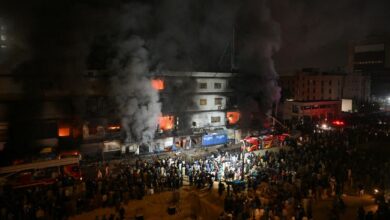Under the Tunsi Bridge, a few ramshackle huts stand amid the charred remains of what was once one of Cairo’s most vibrant and eclectic markets.
Like many others in this area, the families in these huts lived off this marketplace and made it their literal home for the past few years. But, it appears, not for much longer. The Arab Contractors’ bulldozers laze about in the background waiting for the government to evict these "illegal" residents.
Between on-going eviction ultimatums and delayed relocation, the fate of the Tunsi merchants remains unknown.
The Tunsi market, known affectionately as Souq Elgom’a (The Friday Market), was set ablaze on 21 June. At 2AM a car fell off the bridge and exploded, killing its three passengers and setting alight the entire market area, including many of the few modest dwellings. Left in the accident's wake was lost livelihoods and a damaged landmark. The Cairo Governorate wasted no time to announce new plans for the market, and on 24 June, declared The Friday Market to be moved to a new location in the 15th of May City.
Not surprisingly, the dislocation of the market from one of Cairo's most lively and populous parts of the city to a secluded destination barely in its nascent stages of development caused consternation for many of the merchants.
The decision itself did not come as a surprise. The governorate has long since aimed to move all the markets to the outskirts of the city for the stated purpose of easing the oppressive urban congestion.
The surprise came for the merchants who went to visit the new location they were promised. There they found only a bulldozer sitting idly in a slightly sequestered desert area, surrounded by an un-cordoned expanse of uninhabited land.
"We made the trip over there, and found nothing," En’am, an antiques merchant said. "They told us the new market would be ready in three months. I'll not be surprised if it's ready in three years."
Many of the questions being raised revolve around the hastened manner of the relocation process. The Khalifa district and the governorate have nonetheless assured the merchants that their new market will be ready soon. They should not worry, authorities said.
The Center for Planning and Architecture Studies (CPAS) has been contracted by the Ministry of Housing to take charge of the current phase of urban planning for the 15 May City, including the relocated Tunsi Market.
Chairman of CPAS Mohamed Ibrahim said his office has only received the specifications for the Tunsi Market project two months ago, a month after the fire and the governorate’s declaration of the market’s relocation. “For any project such as this, we need at least a full year of planning, so we will be finished the planning alone in ten months,” he said.
Execution is another story entirely. The area currently lacks any of the “critical, success factors” needed for it to move forward.
Infrastructure, transportation, and residence are all vital for the success of the project, but right now, according to Ibrahim, “are non-existent in the entire zone surrounding the proposed new market area.”
The Cairo Governorate’s website states that an acre of land has been allocated for the relocated market, “only 500 meters from residential areas, built with the highest of standards…it will be enclosed to maintain its organization and security.”
“If they have made all these plans, then why didn’t they show us?” Ibrahim questioned. “As of right now, we’re still trying to settle on the precise coordinates of the new market and it is nowhere near any residences.”
As for the merchants, they have been told to go set up shop at the nearby Imam market until their place in the new market opens up. Many of Tunsi’s merchants began their careers in the more menacing environment of Imam market before moving to pedal their goods under the bridge in the mid-1990s.
“We used to sell there, so we know the place. It’s ok, except that we’re not used to having to pay gangs money for them to leave us alone,” Gamal, an electronic salesman, said. “If they are going to keep us from restarting the market here, and living here, then just give us the alternative instead of just throwing us out like dogs with no place to go. We won’t resist the government because it’s useless. No one in the world is stronger than the government. We are just tired and want to be treated like human beings.”
Legally, the merchants are living illegally on government land, since the market space has grown sporadically. However, they have resided there since 1994 and, according to those residents, have not been told to move since.
The head of Khalifa District, General Atef Megahed argues that the area is hazardous and must be vacated, at the very least to renovate the bridge, which was heavily damaged by the fire and is dangerous for those under it. In response to their request for alternative housing, he dryly informed the residents that they have been living there illegally for the past 15 years and can legally be forcibly removed.
It is now up to the governor’s good graces to offer an alternative. No one is holding their breath.
“We’re always promised things, in this country that doesn’t mean anything, whether it’s for housing or the new market,” Om Ahmed, a tea seller and resident under the bridge, said.
A foreman for the Arab Contractors work-site under the bridge, who refused to give his name, claims that the only plans in place for the Tunsi Market location, is to build roads under the bridge for heavy vehicles and to ease traffic on the bridge.
“The market sprung out in this area spontaneously and became the axis around which entire lives were built…It will take a lot to recreate this," Ibrahim said. "The decision to move it was unfortunately taken too quickly and reflexively.”
Ibrahim argues that it will take a considerable amount of time-beyond planning and execution before the local authorities are able to make the market area in the15 of May City attractive for merchants, customers, and residents alike.
Meanwhile, some of the merchants maintain hope in the 15 May of location. Their belief is that their market’s appeal and clientele transcends location and adversity.
“There’s hope–if we actually move to the 15 May–our clients will come there and we’ll even make new ones," the antiquities merchant En’am said. "This is an international market, Egypt’s best."




